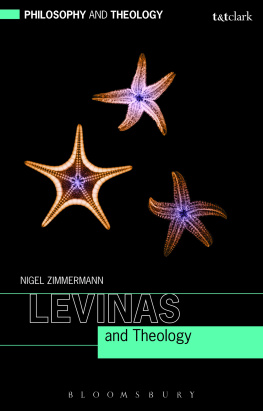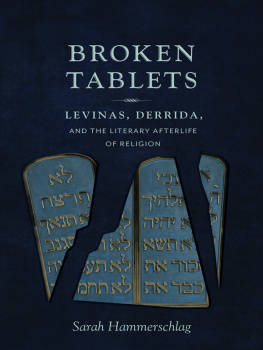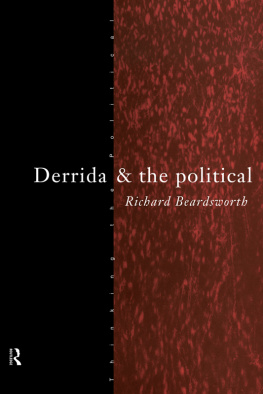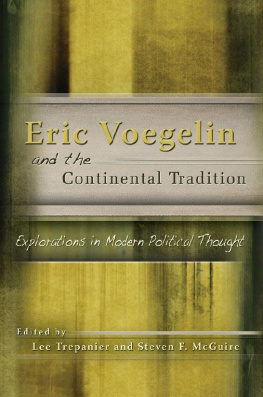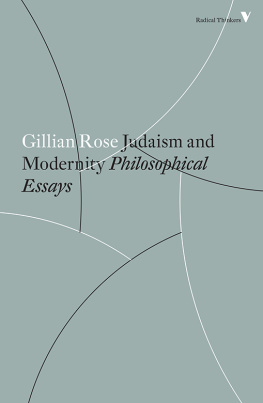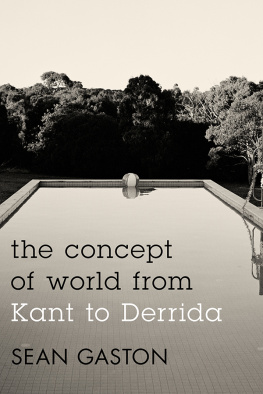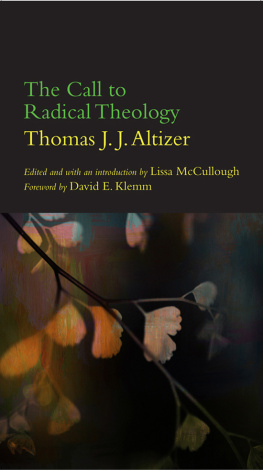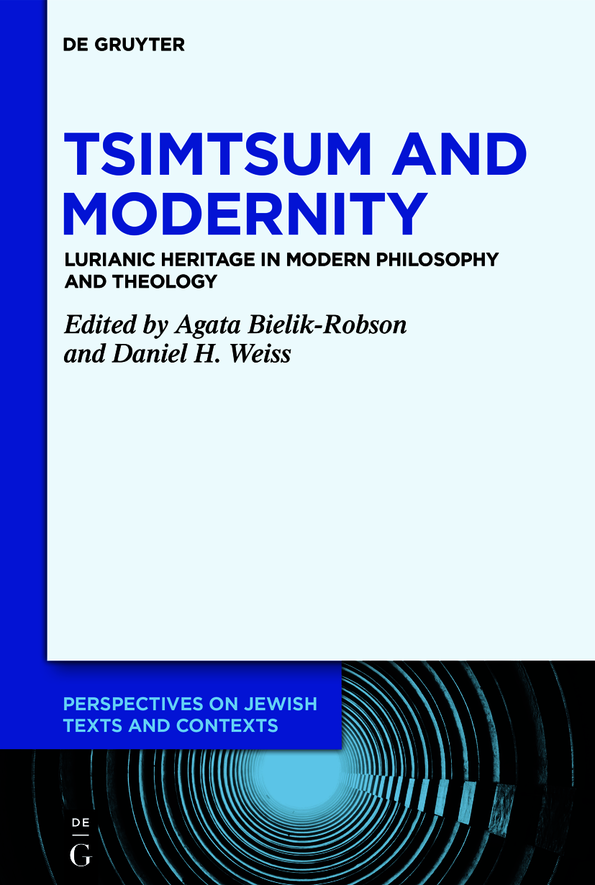Perspectives on Jewish Texts and Contexts
Edited by
Vivian Liska
Robert Alter
Steven E. Aschheim
Richard I. Cohen
Mark H. Gelber
Moshe Halbertal
Christine Hayes
Moshe Idel
Samuel Moyn
Ada Rapoport-Albert
Alvin Rosenfeld
David Ruderman
Bernd Witte
Volume
ISBN 9783110684285
e-ISBN (PDF) 9783110684353
e-ISBN (EPUB) 9783110684421
Bibliographic information published by the Deutsche Nationalbibliothek
The Deutsche Nationalbibliothek lists this publication in the Deutsche Nationalbibliografie; detailed bibliographic data are available on the Internet at http://dnb.dnb.de.
2021 Walter de Gruyter GmbH, Berlin/Boston
This publication was made possible thanks to the support of NCN Opus 13 Grant: The Marrano Phenomenon: The Jewish Hidden Tradition and Modernity, registered in the OSF system as 2017/25/B/HS2/02901, and the Polonsky-Coexist Fund in the Faculty of Divinity, University of Cambridge.
Notes
Christoph Schulte, Zimzum: Gott und Weltursprung (Frankfurt am Main: Suhrkamp, 2014).
Moshe Idel, Italy in Safed, Safed in Italy, in Cultural Intermediaries: Jewish Intellectuals in Early Modern Italy, eds. David B. Ruderman, Giuseppe Veltri (Philadelphia: University of Pennsylvania Press, 2004), 25556.
On the non-historical agenda of Gershom Scholem, who was more theologico-philosophically involved than he himself wished to admit, see most of all a daring diagnosis of Harold Bloom: Gershom Scholem, masking truly as a historical scholar, was the hidden theologian of Jewish Gnosis for our time [] Rarely unmasking, Scholem sometimes hinted his truest desires. One of these hints is his sequence of Ten Unhistorical Aphorisms on Kabbalah, first printed in 1958: Authentic tradition remains hidden [] Indeed, for a host of contemporary Jewish intellectuals, the Kabbalah of Gershom Scholem is now more normative than normative Judaism itself. For them, Scholem is far more than a historian, far more than a theologian. He is not less than a prophet, though his prophecy is severly limited by evasiveness. Harold Bloom, Scholem: Unhistorical or Jewish Gnosticism, in The Strong Light of the Canonical: Kafka, Freud and Scholem as Revisionists of Jewish Culture and Thought (New York: The City College Papers, vol. 20, 1987), 55; 76.
G.W.F. Hegel, Faith and Knowledge, trans. W. Cerf and H. S. Harris (Albany, NY: SUNY Press, 1977), 134: The feeling that God himself is dead is the sentiment on which the religion of modern times rests.
See Ernst Bloch, Atheism in Christianity, trans. J. T. Swann (London: Verso, 2009); Jrgen Moltmann, Theology of Hope: On the Ground and the Implications of a Christian Eschatology, trans. James W. Leitch (Minneapolis: Fortress Press, 1993); Thomas Altizer, Radical Theology and the Death of God (co-authored with William Hamilton) (London: Penguin, 1966); Slavoj iek, The Puppet and the Dwarf: The Perverse Core of Christianity (Cambridge, Mass.: MIT Press, 2003).
Introduction
Agata Bielik-Robson
An Unhistorical History of Tsimtsum: A Break with Neoplatonism?
The role of this introductory chapter is to outline the space of the tsimtsum debate, by posing the main philosophical question around which this debate centers: to what extent is Lurianic tsimtsum innovative? Does it have a potential to revolutionize modern metaphysics and turn it away from the Neoplatonic tradition? And has this potential been realized or is it still a matter of future speculative developments?
Gershom Scholem was the first thinker who emphasized the power of tsimtsum as a category that spurred modern thought to explore new metaphysical possibilities. One of his most intriguing hypotheses is that the Kabbalah, especially in its Lurianic version, sought to break with Neoplatonism, which it adopted as the most advanced default discourse of medieval metaphysics and simultaneously resisted as not fully suitable to convey its most important message. Scholem refers to this most significant intention by calling it mystical nominalism: a view according to which the core of creation consists of concrete, material, and thoroughly individuated beings.
In the seventh thesis of his Ten Unhistorical Aphorisms on Kabbalah, Scholem states:
Als das eigentliche Unglck der Kabbala darf man vielleicht (wie bei vielen nicht nach Hause gekommenen Formen der Mystik) die Emanationslehre betrachten. Die Einsichten der Kabbalisten betrafen Strukturen des Seienden. Nichts verhngnisvoller, als den Zusammenhang dieser Strukturen mit der Emanationslehre zu konfundieren. Diese Konfusion pervertiert ihre aussichtsreichsten Anstze zugunsten der bequemsten und denkfaulsten aller Theorien. Cordovero wre als Phnomenologe eher nach Hause gekommen denn als Schler Plotins. Der Versuch, das Denken der Kabbalisten ohne Benutzung der Emanationslehre aufzubauen (und zu Ende zu denken), wre die Begleichung der Schuld, die ein echter Schler Cordoveros auf sich zu nehmen htte, wenn es einmal einen geben sollte. In der Form der theosophischen Topographie, die die kabbalistischen Lehren in der Literatur angenommen haben, bleibt ihr sachlicher Gehalt unzugnglich. Der Widerstreit des mystischen Nominalismus und der Lichtsymbolik in den Kabbalistischen Schriften stammt aus dieser unausgetragenen Spannung zwischen ihren bedeutendsten Intentionen und ihrer Unfhigkeit, ihnen zu reinem Ausdruck zu verhelfen. [Perhaps the most essential misfortune of the Kabbalah (similar in this respect to many not fully realised forms of mysticism) was the adoption of the emanationist teaching. The insights of the Kabbalists were directed towards the structures of being. But there could be nothing more fatal than to confuse those structures with the theory of emanation. This confusion perverts the most perceptive kabbalistic theses when they are read in conformity with this most lazy and intellectually false of all theories. Cordovero would have fared much better as a phenomenologist than as a pupil of Plotinus. The attempt to think Kabbalah without the use of the emanationist teaching (and thus think it to the end) would be an expiation of the sin, which a true pupil of Cordovero if there ever were going to be one should have endeavoured. In the form of the theosophic topography, which the kabbalistic teaching assumed in the later literature, its content remains unaccessible. The conflict between the mystical nominalism and the symbolic of light in the kabbalistic writings derives from their irresolved tension between their most significant intentions and their incapability to articulate them clearly and fully.]
The difficulty of this seventh aphorism lies in its use of conditionals, all of them in the most unrealised modus irrealis: if only Cordovero had chosen unhistorically to convey his message in the phenomenological terms, he would have been closer to the realisation of his mystical-nominalist intention; if only there were ever going to appear a right pupil of Cordovero, and not just a student of kabbalistic history, he would have renounced the Neoplatonic garment of the misleading symbolism of light and given us a more realised account of this peculiar type of mysticism where concrete material things actually matter; if only Plotinus emanation had not been adopted by the Kabbalists, the most ingenious and innovative content of their theory could have become more accessible and less mysterious; if only we, the contemporary readers of Kabbalah, were bold enough to break from the authority of history and dared to think it to the end in the theoretical languages which appeared only later.


